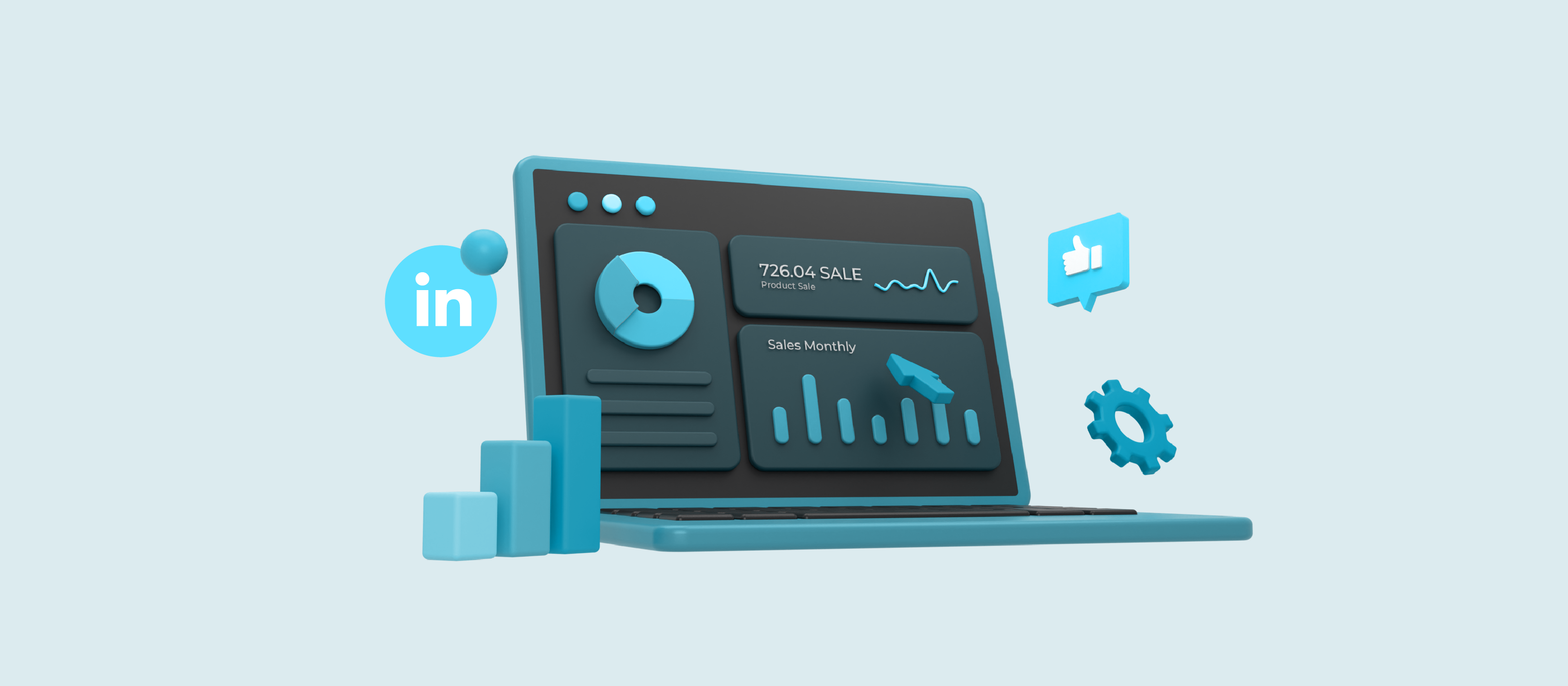Hello!
For many businesses, paid advertising remains an important channel for promoting products and services and generating sales—and social media is their platform of choice.
 Not only is social media where your potential customers most like to spend their time, now more than ever it’s also consumers’ go-to resource for discovering information about businesses, products, and services.
Not only is social media where your potential customers most like to spend their time, now more than ever it’s also consumers’ go-to resource for discovering information about businesses, products, and services.
B2Bs can especially take advantage of social media to find, connect with, and promote their business to a vast and targeted audience—and there’s no more effective network for doing so than through LinkedIn.
Why Should LinkedIn Advertising Be Part of Your B2B Marketing Strategy?
We talk a lot about the benefits B2Bs can experience from developing a strong presence on LinkedIn, including improving public awareness of their brand and establishing themselves as thought leaders. Advertising on the platform is no different—and using Sponsored Updates, we’ve led our own B2B clients’ campaigns to success.
 There are many reasons why advertising on LinkedIn through Sponsored Updates is a smart move for B2Bs, including:
There are many reasons why advertising on LinkedIn through Sponsored Updates is a smart move for B2Bs, including:
- It’s effective. LinkedIn boasts a 2.74 percent view-to-lead conversion rate, compared to .69 percent and .77 percent for Twitter and Facebook respectively.
- Your audience is there. One-third of the world’s professionals use LinkedIn, meaning you’re bound to be able to attract the eyes you’re looking to target.
- Sponsored Updates drive conversions. A whopping 4 out of 5 members on LinkedIn are also decision makers within their respective businesses—and these members also have 2x the purchasing power of the average adult internet user in the U.S.
So—is your B2B company looking to start taking advantage of LinkedIn’s huge professional audience and comprehensive targeting features by advertising on the platform?
Below, check out our proven strategies for B2Bs looking to maximize their efforts advertising on LinkedIn.
Advertising on LinkedIn: Expert Strategies for B2Bs
Setting Yourself Up for Success
To advertise effectively on LinkedIn, first you have to optimize your campaign from set-up. Our expert tips for setting your campaign up for success include:
Know Your End Goal
 When advertising on LinkedIn, B2Bs typically have one of the following goals: improving brand awareness and engagement or driving lead generation and conversions.
When advertising on LinkedIn, B2Bs typically have one of the following goals: improving brand awareness and engagement or driving lead generation and conversions.
It’s critical that your team understand the goal of your LinkedIn advertising campaign before you start building out your Sponsored Updates, as your goal informs how you should measure the success of your campaign and what specific metrics you should be tracking.
B2Bs seeking to extend the reach of their business and improve public knowledge of their brand should ultimately focus their campaign analysis efforts on monitoring the number of impressions their Sponsored Updates are receiving as well as the engagement rate.
On the other hand, B2Bs looking to convert potential customers into leads and sales should look at the CTRs of their ads.
Your advertising campaign goals inform everything from how you should create your Updates to how you should determine success, so know your goal (and maybe write it on a whiteboard or two in your office…)
Develop a Compelling Offer & Landing Page
 To see success through LinkedIn Sponsored Updates, you need to give before you can get.
To see success through LinkedIn Sponsored Updates, you need to give before you can get.
B2Bs looking to boost awareness with their campaign might link their ad to a recent blog post, but for those looking to convert their audience, it’s important to develop a valuable and compelling offer to entice engagement, such as an in-depth piece of content like an eBook or whitepaper or a product demo.
High quality content is an especially effective offer for driving conversions—a study showed that 74 percent of B2B buyers ended up choosing a company that was first to assist them in the buying process by offering useful content and information.
If your campaign goal is to convert users, you should also gate your offer behind a landing page so that viewers must submit their contact information before receiving it. Ultimately, this is still a win-win situation for both parties—you generate a new lead to add to future marketing efforts and the viewer receives what they wanted from you.
Optimizing Your Creatives to Drive Results
Your creatives are the lifeblood of your advertising campaign, and need to be developed with consideration of best practices in mind to get you the results you desire.
We have plenty of experience optimizing our clients’ LinkedIn ads and associated landing pages to ensure their engagement and conversion potential is maximized. Below, we share our top creative optimization strategies pulled from years of campaign success and lessons learned.
Get creative with your ad copy.
 Consumers are so used to spotting and avoiding online advertising attempts that many all but ignore most digital ads at this point. This is why B2Bs need to get creative with their LinkedIn ad copy and use it to drive the desired action from their target audience.
Consumers are so used to spotting and avoiding online advertising attempts that many all but ignore most digital ads at this point. This is why B2Bs need to get creative with their LinkedIn ad copy and use it to drive the desired action from their target audience.
Remember that your potential customers are human and want to be treated as such, so consider engaging them right off the bat by asking a question within the update itself.
In the ad below, our client was doing this particular best practice but failing to optimize other aspects of the ad, including the ad’s headline and description.
Here is the original version of the ad offering a downloadable report from our cybersecurity client, as well as the results:
And here is the optimized ad offering the same asset and its results (after receiving the same amount of impressions as the previous ad):
You can see that our optimized ad saw an incredible improvement in both CTR and engagement rate.
 We were successfully able to improve our client’s campaign effectiveness by crafting our copy to appeal to the audience in the following ways:
We were successfully able to improve our client’s campaign effectiveness by crafting our copy to appeal to the audience in the following ways:
- Catching Their Eyes. We included a number—and quite an attention-grabbing one—in the update itself, which is a best practice for attracting the eyes of your target audience.
- Engaging Them Emotionally. We incorporated language that tugs on the emotions—such as “cost” and “shocking”—throughout the ad to engage a viewer no matter which part of it they’re reading. Wouldn’t you want to read on as an at-risk business owner after discovering that DDoS attacks are more-costly than ever?
- Inviting Action. We included a CTA in the update of our ad—“Download the DDoS Impact Report”—that let the reader know exactly what action we wanted them to take, helping guide them down the sales funnel.
- Ensuring Ad Consistency. We ensured that the asset and ad copy were in sync, eliminating the instance where the client referred the asset as a survey instead of a report (we’ll discuss more about message match later in this post.)
Add a high quality image to your ad that aligns with your copy.
 Part of the reason Sponsored Updates are so effective for B2B advertising (and why we choose to use them over text ads) is that they give the user the option to add an image—a best practice for driving improved engagement from LinkedIn audiences.
Part of the reason Sponsored Updates are so effective for B2B advertising (and why we choose to use them over text ads) is that they give the user the option to add an image—a best practice for driving improved engagement from LinkedIn audiences.
In the above example, by using a playful picture of army men that aligned with and bolstered the ad’s message about being “under threat of attack”, we were able to successfully improve the ad’s engagement rate, CTR, and the number of social actions taken from viewers.
Another important image-related note to incorporate into your B2B LinkedIn strategy is to refrain from using any that include text. Images with text are not optimal for mobile users and will typically become unreadable even when viewed from a desktop.
Ensure landing page messaging is consistent with your ad and offer.
Consider this: a potential customer views your ad offering a piece of content only to be redirected to your website’s homepage upon clicking your ad. Think they’re going to stick around to find that piece of content and convert into a lead? Likely not.
 One easy way to screw up your campaign conversion rate potential is by allowing inconsistencies to exist between your landing page and the ad linking to it.
One easy way to screw up your campaign conversion rate potential is by allowing inconsistencies to exist between your landing page and the ad linking to it.
B2Bs with the goal of driving conversions with their LinkedIn advertising campaign need to ensure that messaging is consistent across their landing pages and ads—from language and branding to the offer itself.
As an example, recently we created a LinkedIn campaign for our land surveyor client who had an eBook to offer on drones and wanted to target and convert employees of companies in the oil & energy industries.
Here is the Sponsored Update offering a downloadable eBook:
 And here is the associated landing page
And here is the associated landing page
You can see that we kept important language and keywords—such as “drones”, “unmanned aerial”, and “oil & energy”—consistent across both the ad and the landing page, and made sure to reiterate the offer multiple times: a FREE eBook.
We also highlighted the value of the eBook by teasing viewers with what they would learn from reading it via both the ad and the landing page.
To drive B2B conversions by advertising on LinkedIn, it’s not enough just to have a landing page—you also have to ensure that ad viewers can seamlessly transition into converted leads by eliminating any discrepancies between the landing page and the ads they’re associated with.
Thank you!
Join us on social media!
See you!






